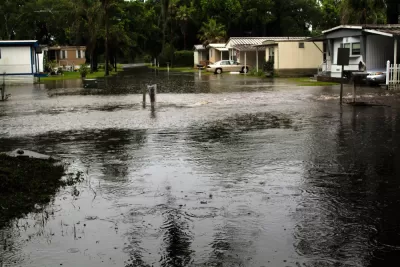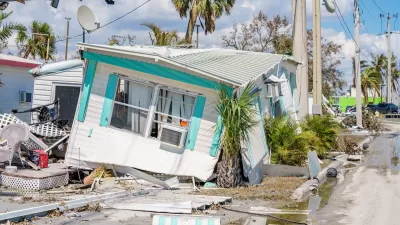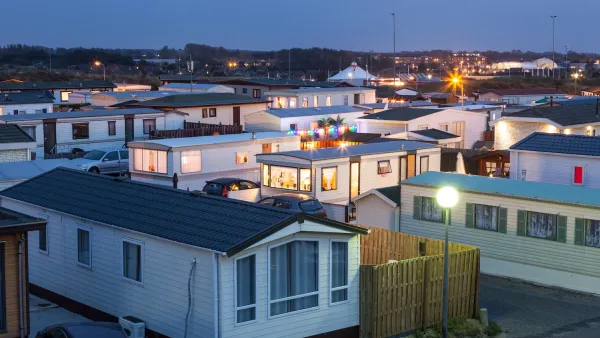A key supply of low-cost housing is under threat from extreme weather, rising sea levels, and other impacts of climate change.

Manufactured housing, often described as mobile homes (despite the high cost of relocation for these units), offers some of the most affordable housing in many parts of the country.
But with climate disasters posing growing threats to residential communities, manufactured home residents face some of the highest risks, writes Sarah Amandolare in Nexus Media News. “Across the U.S., biased zoning has sited many manufactured housing communities in precarious ‘fringe environments,’ such as floodplains and fire-prone urban edges, according to Zachary Lamb, a climate adaptation researcher at UC Berkeley.”
As Amandolare explains, climate change is now causing more destructive weather events in these areas, forcing communities to find ways to keep residents safe or relocate without raising the cost of living. A Vermont program in the Tri-Park Cooperative, a resident-owned mobile home community, could provide a new model for assisting homeowners with relocation. “Tri-Park residents each pay the same monthly rent to the co-op for their lot – an amount that won’t change for those who relocate – and the cost of their new homes will be covered by Vermont’s new Flood Resilient Communities Fund, rather than FEMA.” The program is administered by Vermont Emergency Management and was allocated $14.75 million by the state in 2022.
FULL STORY: Mobile Homes Offer Low-Cost Living. Now, They’re Threatened by Climate Change.

Maui's Vacation Rental Debate Turns Ugly
Verbal attacks, misinformation campaigns and fistfights plague a high-stakes debate to convert thousands of vacation rentals into long-term housing.

Planetizen Federal Action Tracker
A weekly monitor of how Trump’s orders and actions are impacting planners and planning in America.

San Francisco Suspends Traffic Calming Amidst Record Deaths
Citing “a challenging fiscal landscape,” the city will cease the program on the heels of 42 traffic deaths, including 24 pedestrians.

Defunct Pittsburgh Power Plant to Become Residential Tower
A decommissioned steam heat plant will be redeveloped into almost 100 affordable housing units.

Trump Prompts Restructuring of Transportation Research Board in “Unprecedented Overreach”
The TRB has eliminated more than half of its committees including those focused on climate, equity, and cities.

Amtrak Rolls Out New Orleans to Alabama “Mardi Gras” Train
The new service will operate morning and evening departures between Mobile and New Orleans.
Urban Design for Planners 1: Software Tools
This six-course series explores essential urban design concepts using open source software and equips planners with the tools they need to participate fully in the urban design process.
Planning for Universal Design
Learn the tools for implementing Universal Design in planning regulations.
Heyer Gruel & Associates PA
JM Goldson LLC
Custer County Colorado
City of Camden Redevelopment Agency
City of Astoria
Transportation Research & Education Center (TREC) at Portland State University
Jefferson Parish Government
Camden Redevelopment Agency
City of Claremont





























